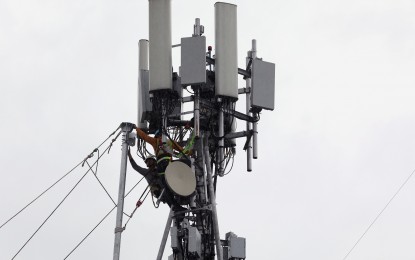
File photo
MANILA – Malacañang is alarmed by the “slow” implementation of the government’s PHP1.3-billion nationwide free Wi-Fi project.
Presidential Spokesperson Harry Roque said currently, only 10,000 sites out of the 120,000 sites across the country have achieved free internet access.
He said that it was “unacceptable” that only 10,000 sites have managed to acquire free Wi-Fi access since Republic Act (RA) 10929 or the “Free WiFi for All” program was signed in August 2017.
“Mula noon hanggang ngayon eh talagang medyo nakakabahala po iyong bagal nang pag-implement nitong libreng Wi-Fi ‘no (From then until now, the slow implementation of this free Wi-Fi is really a bit alarming),” he said in a Palace press briefing on Monday.
Roque said the national government is “unhappy” with the performance of the multinational contractor, Speedcast, which was hired by the United Nations Development Program (UNDP) to import telecom equipment for the free Wi-Fi project.
“Bilang isang pangunahing awtor nung batas, siyempre po hindi tayo happy. Kinakailangan ang pangako natin libreng Wi-Fi sa lahat, dapat magkaroon pa rin iyan ng katuparan sa administrasyon ni Presidente (As the primary author of the law, of course, we’re not happy. Our promise of free Wi-Fi for all should be accomplished in the administration of President) Duterte and we have one year to go,” he said.
He said President Rodrigo Duterte and the Department of Information and Communication Technology (DICT) are considering to kick Speedcast out of the project, echoing the view of Speedcast’s local consignee, the semi-government Philippine Communication Satellite Corp. (Philcomsat) which exposed Speedcast’s technical smuggling and bribery deals discovered in July 2020.
“With this latest controversy, ang posisyon po talaga ng Presidente at ng DICT ay itigil na iyong involvement nitong current contractor, na foreign contractor na ito at ibalik na iyong mga pera na naibayad na sa kanila dahil pupuwede na pong ipagpatuloy iyan ng ating DICT (With this latest controversy, the position of the President and the DICT is to stop the involvement of the current foreign contractor and retrieve the money given to them because the DICT can take over the project),” he said.
Amid controversies, Roque said the DICT is now competent enough to roll out the project.
“Ngayon po eh may ganiyang kakayahan na mag-roll out ang DICT at sa katunayan po na sa taong 2020 alone eh nakapag-install po ang DICT nang 500 percent more Wi-Fi sites compared doon sa mga total na in-install nitong foreign contractor na ito from the year 2015 to 2019 (Now, DICT has such the ability to roll out and in fact, in the year 2020 alone, DICT was able to install 500 percent more Wi-Fi sites compared to the total installed by this foreign contractor from the year 2015 to 2019),” he said.
He also backed plans of Congress to probe the Wi-Fi project, noting that it has been suffering from delays and now marred by a series of reports of smuggling, bribery, and allegations of negligence and incompetence.
“We support any further investigation to be conducted by the legislative branch of government as part of their oversight functions,” he said.
Meeting the target
With current efforts underway, Roque expressed hope that the government could still meet its target of achieving 110,000 more Wi-Fi sites before the end of the Duterte administration in 2022.
“Titingnan naman po natin kung talagang mapapatupad natin ‘yan ‘no (We will see if we can really implement that) -- 10,000 sites installed; 120,000 so 110,000 sites left to go. Pero sa bilis naman po ng galaw ng DICT ngayon (But at the speed of DICT’s movement now), we have confidence that we can meet at least close to the target if not a 110,000 more sites,” he added.
He also emphasized the need to recognize internet access as a human right.
“Importante po ang Wi-Fi talaga na isang human rights na po iyan. Karapatang-pantao na po iyan, ang tawag po diyan ay (Wi-Fi is a human right. It’s called) right to connectivity,” he said.
Last month, the Bureau of Customs informed the DICT of its discovery of UNDP’s Speedcast undervaluing on the importation of telecom equipment.
BOC said Speedcast should be held liable for the misdeclaration of shipment values. (PNA)
